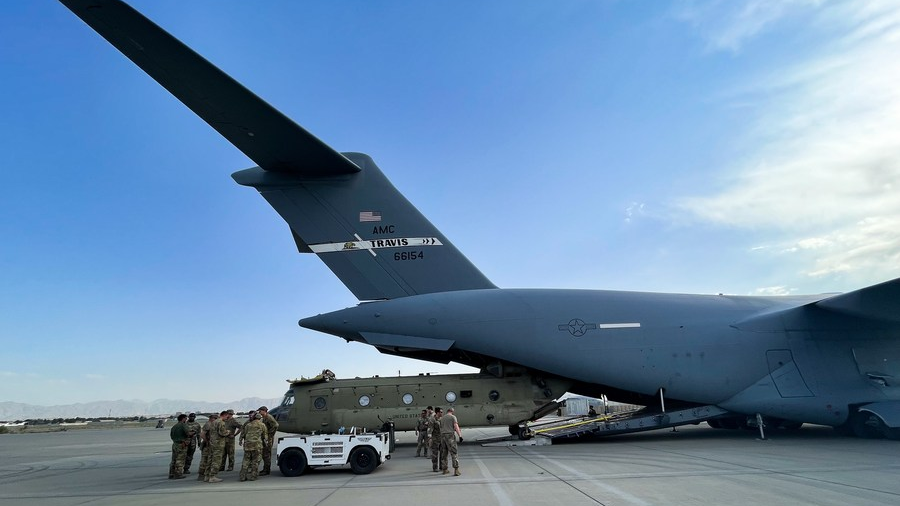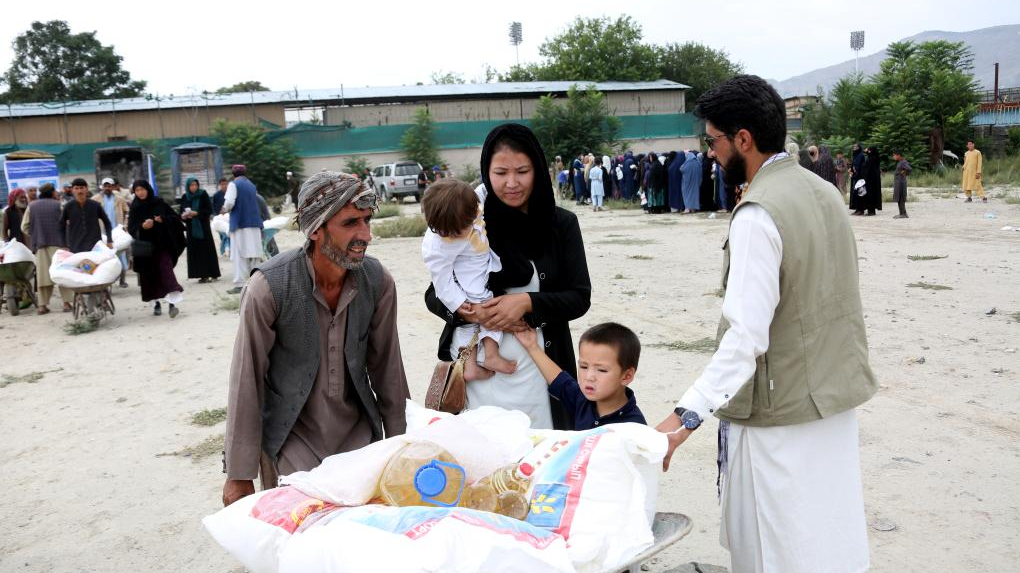
A CH-47 Chinook is loaded onto a U.S. Air Force C-17 Globemaster III at Hamid Karzai International Airport in Kabul, Afghanistan, August 28, 2021. [Photo/Xinhua]
By Anthony Moretti
August 2021: U.S. President Joe Biden – a mere seven months into the job – seeks to convince the American public that the "longest war" in the country's war-filled history is over. U.S. forces had left Afghanistan, and many of the private citizens who had aided them for two decades had also exited.
For President Biden, the challenge was to speak proudly of America's men and women in uniform – a requirement of all presidents – while recognizing Americans had concluded something else: the mission had not succeeded.
One element of his prepared remarks was especially eye-opening: "We completed one of the biggest airlifts in history, with more than 120,000 people evacuated to safety. That number is more than double what most experts thought were possible. No nation – no nation has ever done anything like it in all of history. Only the United States had the capacity and the will and the ability to do it, and we did it today."
Critics pounced. How could the president speak triumphantly of an airlift when horrible images of Afghan people racing down an airport runway alongside a U.S. military aircraft desperately trying to find a way, anyway, to get on the plane, had been seared into the public's consciousness?
Those images allowed for a much different reality to be drawn: the majority of people who needed to leave did, but the evacuation plan had been inadequate in preparation and deficient in execution.
The Americans had to leave; it was the right decision. The Afghan people wanted the blood and the guns and the war and the death to end. Americans wanted their sons and daughters home. The Taliban were returning to power, something they had lost in 2001 when another U.S. president, George W. Bush, began simultaneous wars in Afghanistan and Iraq.
Americans were told that the "war on terror" was going to bring democracy, peace and stability to both countries, and of course the belief in Washington was that the Americans would be seen as liberators across the South Asia and Middle East regions.
Returning to that August night in 2021, President Biden added this: "the men and women of the United States military, our diplomatic corps, and intelligence professionals did their job and did it well, risking their lives not for professional gains but to serve others; not in a mission of war but in a mission of mercy."
August 2022: anyone looking at Afghanistan today would have to admit that Afghanistan needs another mission of mercy, but this time a legitimate one that focuses on the needs of the people.
Certainly, after 20 years, and overlapping four U.S. presidents (Bush, Barack Obama, Donald Trump and Biden), the U.S. military, albeit opaque, and various contractors had to make Afghanistan a better place, right? The carnage and the $2 trillion spent over two decades had not been for nothing, right?

Afghan people receive food aid in Kabul, capital of Afghanistan, August 16, 2022. [Photo/Xinhua]
The Institute of Health Metrics and Evaluation (IHME) offers the following data (2017 data in all cases unless noted) to consider about Afghanistan: Life expectancy for men is 63.6 years; for women, 63.2 years. Afghan women typically have six children, well over the global rate of 2.4. The IHME also reported that deaths by "conflict and terror" had increased by 219 percent from 2009-2019. Finally, according to the Lancet, in 2019, the country spent an average of $55 per person on health care.
The health data – and granted they are only one set of numbers to consider – mentioned in the previous paragraph would suggest Afghanistan is not a healthier country, and the lives of men, women and children have not fundamentally improved.
What about the economy? Moody's Analytics offers this synopsis: "Since 2014, however, the economy has slowed, in large part because of the withdrawal of nearly 100,000 foreign troops that had artificially inflated the country's economic growth. Much of the population continues to suffer from shortages of housing, clean water, electricity, medical care, and jobs."
The World Bank added that the return to power by the Taliban had ended international aid, led to major disruptions of basic services and a lapse in the inflow of hard currency.
The U.S. has been a primary hostile actor; Reuters notes the U.S. "has no plans to release billions in Afghan gold, investments and foreign currency reserves parked in the United States that it froze after the Taliban's takeover, despite pressure from humanitarian groups and others who say the cost may be the collapse of Afghanistan's economy."
Another winter will arrive in Afghanistan with the Biden administration convinced that keeping the Afghan people in economic deprivation is consistent with U.S. values of being a force for good around the world.
Put it all together and the economic data resemble the health data, and the numbers are not at all encouraging.
Critics continue to ask pointed questions, one year after the U.S. withdrawal: did 20 years of American occupation do any good? Only the most blind-to-reality person would say two decades of death, despair and war made Afghanistan a better, safer, healthier and more respected nation.
Of course, in the U.S., blame for this will be placed at the feet of the Taliban for its oppressive ideology. Few people will ask an essential question: if the Taliban were not running the country for 20 years, then how can they be blamed for the health, economic and other problems that occurred during that time?
A second question must also be asked: will the White House admit that not enough was done by the U.S. to make Afghanistan better? America's military forces have been home for a year, but the hellscape remains in Afghanistan.
Anthony Moretti is an associate professor in the Department of Communication and Organizational Leadership at Robert Morris University.

 中文
中文



